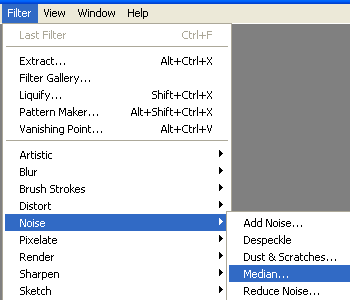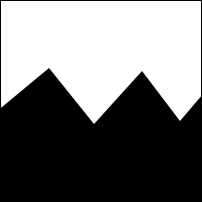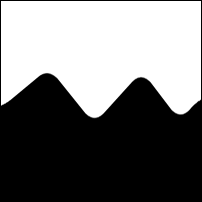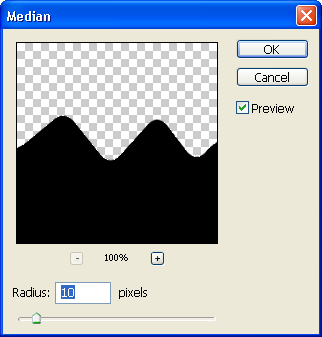In my attempts to wean myself off as many commercial applications as possible, I decided to give The GIMP another try. I grabbed the Win32 installer for GIMP 2.2.17, which made installation a breeze. It certainly starts up much faster than Photoshop CS2, which is another big plus. It is amazing how featureful it is for a free software application.
But … there’s still a functionality gap between it and Photoshop and that’ll make it hard to switch completely. Specifically, where is GIMP’s equivalent of Photoshop’s “Median” filter? Not sure what I’m talking about? I’m referring to this:

It’s a really useful filter and I can’t seem to find the equivalent in GIMP. It’s good for smoothing sharp edges into curves, like this:


(Before and after)
Getting this effect is as easy as this in Photoshop:

But, how do you do it in GIMP? I’ve searched and the best I’ve found is people suggesting that GIMP’s “Filters > Enhance > Despeckle” has a “Median” filter, but it’s not even close to the same effect.
So, if there’s a GIMP wizard out there who knows GIMP inside and out, what’s the magic incantation to reproduce this effect that’s easily done in Photoshop, in GIMP?
Update: I found
Personally, I like the way the GIMP preserved the straightness of the lines as the approach the edge. But is that little dot in the GIMP image a scaling artifact or a result of the Despeckle filter?
Yes, GIMP doesn’t seem to antialias the curve as much as Photoshop does. It would be nice to add an “antialias” setting in GIMP so it could be controlled.
Regarding the speck on the left side, I’m not sure if it’s an scaling artefact or the Despeckle filter, or something else. If I get a chance, I’ll try to reproduce it and see.
Thanks for commenting!
man, median filter application is mainly to remove the salt-pepper noise, not to make wavy edges… I like the way you think :D
Of course the main difference between PS and Gimp is that you don’t have to puzzle over cryptic filters and lack of documentation in PS.
Gimp developers need to write a few words on what does what!
It’s my biggest gripe about open source programs.
Stuart: You’re right, the lack of documentation in many open source projects – not all, mind you, some have excellent documentation, better than some commercial applications – is a real hurdle. However, it is an open source project: you are generally encouraged to contribute whatever you can, even documentation, to it.
Look at it this way: Assume for a moment that Photoshop CS4 and Gimp were functionally equivalent (I know they are not, just pretend for a moment, please). Would you consider paying the $699 for Photoshop CS4 for its documentation alone?
I don’t value the documentation that highly, so I gladly use Gimp without documentation but also without the extra cost. Other folks like yourself clearly feel differently, and open source may not be the best solution in some cases.
Thanks, Dossy. I was looking for that filter equivalent and you helped greatly :).
“However, it is an open source project: you are generally encouraged to contribute whatever you can, even documentation, to it.”
I’m not a programmer but you have given me an idea how to contribute back to the Open Source movement. Once again, thanks!
Thanks, that helped me a lot :)
Also nice use for a median filter!
All the complaints about commercial software having more features than open source.
But in this case it GIMP appeared to lack a feature because it had more options!
I found this site while in search of a function in Photoshop called ‘median/filter’ that would remove the differences in a set of sequential tri-pod photos allowing a monument to be seen without the people crawling all over it. Does anyone know if this very exact feature exists in my Gimp?
Cg_A:
What I think you’re referring to is Photoshop’s “Image Stack” functionality, and the various stack modes:
https://helpx.adobe.com/photoshop/using/image-stacks-photoshop-extended.html
I have no idea if GIMP has this capability. A quick Google search didn’t turn up anything that explains how to do it in GIMP.
The Despeckle filter does exactly the same as the median filter, assuming that you disable “adaptive” and “recursive” and set the black level to -1 and the white level to 256.
Thank you, Lazza!
You are welcome. :)
Lazza, you’re the best!